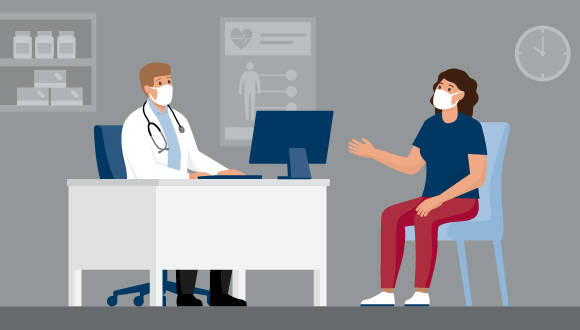Do I really need to see a doctor?
It's a question many people ask — especially when the symptoms you're experiencing don't seem particularly concerning, like a lingering cough.
"Despite what you may tell yourself, major symptoms and incidents aren't the only reasons to go see the doctor. Certain symptoms that may not seem immediately alarming can be a sign of an underlying issue or health condition that requires treatment," says Dr. Joshua Septimus, medical director of Houston Methodist Primary Care Group Same Day Clinics.
Plus, some symptoms can be indications of a life-threatening emergency that warrants immediate medical attention.
Below are 10 signs you might need to see a doctor.
"Keep in mind that this list is by no means exhaustive and, above all, always go with your gut. If instinct tells you something is wrong, it's a good idea to seek medical attention," adds Dr. Septimus.
When are cold-like symptoms actually more than a cold?
As mentioned, it can be hard to know if and when cold-like symptoms warrant attention from your doctor.
"In most cases, cold symptoms can be managed at home via plenty of sleep and fluids, as well as over-the-counter medications if needed. However, there are some signs that you might benefit from seeing a doctor for," says Dr. Septimus.
If you have a worsening cold, watch for the following:
- A severe cough that lingers more than two weeks, which could potentially indicate bacterial bronchitis
- Sustained congestion accompanied by fever and yellow, white or brown nasal drainage, which can lead to a sinus infection if left untreated
- Fever, muscle aches or other flu-like or COVID-like symptoms, since your doctor can prescribe medications that help prevent severe illness, in some cases (Related: Can Heart Disease Increase Your Flu Risk?)
- Persistent vomiting, since you may need an IV to get fluids to help your body function
- Difficulty swallowing, chest pain and shortness of breath, which aren't normal cold symptoms and may instead indicate a more serious condition
Which symptoms are signs that you need to go to the ER?
A medical emergency is a rapid onset of serious, debilitating or painful symptoms that have the potential to impact your life, limbs or bodily function.
Symptoms that require immediate medical attention include:
- Abdominal or stomach pain accompanied by nausea and vomiting
- Bodily trauma, especially to the head or spine
- Fever of 100.4 degrees F or higher that persists
- Headache accompanied by fever and confusion
- Persistent pain or pressure in the chest
- Severe and sudden shortness of breath
- Stroke symptoms, including face drooping, arm weakness, difficulty talking, dizziness, blurred vision, intense headache and confusion
- Severe burns
If you're experiencing any of these symptoms, seek emergency care as soon as possible. (Related: An Emergency Is Still an Emergency — Even During the COVID-19 Pandemic)
Some serious symptoms, such as chest pain and those associated with stroke, are time-sensitive — and the risk of losing function or even your life increases the longer medical attention is delayed. In these events, consider calling 911 so you can receive immediate medical attention.








